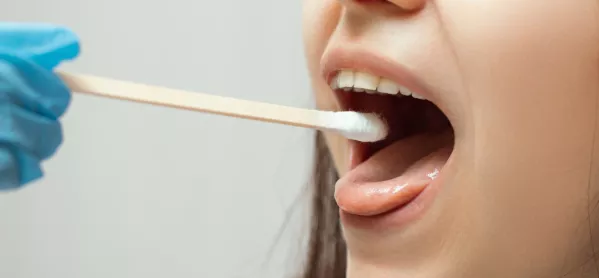
- Home
- What happens if a student tests positive for Covid-19?
What happens if a student tests positive for Covid-19?

With schools reopening next week and the coronavirus pandemic still very active, we asked the Association of School and College Leaders (ASCL), the NAHT school leaders’ union and the Department for Education (DfE) to explain the guidance around what should happen if a student shows symptoms and then tests positive for Covid-19.
What should a school do if a student informs them they suspect they have coronavirus?
When a student suspects they or a member of their household has coronavirus, they should self-isolate immediately and organise to be tested.
If the test comes back negative, the school can tell the student to return to school as normal.
If the test comes back positive, the DfE says “rapid action” to protect their classmates and staff in their setting should take place.
What should happen if a student becomes unwell in school with coronavirus symptoms?
Firstly, the child must be removed to a room where they can be isolated. Ideally, this room should have an open window to allow for ventilation.
If the unwell student needs to use a toilet, then the guidelines state that ”[t]he bathroom must be cleaned and disinfected using standard cleaning products before being used by anyone else”.
The guidelines also say that if the student requires supervision when awaiting collection, then staff must wear PPE while supervising that child if it isn’t possible to socially distance from the student.
The student’s remaining classmates do not need to self-isolate until a positive test result has come back and are then instructed to do so by the test and trace team. However, if they have siblings at school, they do need to also be sent home to self isolate.
This is likely to dictate that anyone who has been in close contact with the infected student should self-isolate for up to 14 days and to take a test if they develop symptoms.
There has been fake news spread online that schools will remove children and detain them without parental consent if they exhibit coronavirus symptoms. Parents may need reassurance that this is not true when they return in September.
Read more
- School reopening: should teachers and pupils wear face masks?
- Coronavirus: the science of school closures
- Back to school: can we close the attainment gap?
What counts as close contact in a school setting?
In the guidance for schools, close contact covers the following:
- Direct close contacts - face-to-face contact with an infected individual for any length of time, within one metre, including being coughed on, a face-to-face conversation, or unprotected physical contact (skin-to-skin).
- Proximity contacts - extended close contact (within one or two metres for more than 15 minutes) with an infected individual.
- Travelling in a small vehicle, like a car, with an infected person.
Ultimately, it will be the local health protection team to decide who meets these criteria and whether it is necessary for individuals to self isolate for 14 days.
How long will those who have tested positive have to self isolate for?
The current advice dictates at least 10 days of isolation after testing positive (assuming the person is well enough after this time to either return to school and/or cease self-isolation).
If the students who have been deemed ‘close contacts’ have also been in contact with other groups of students and staff, should they also self-isolate?
ASCL says that this should only happen if the individual in the ‘close contacts’ group themselves tests positive for coronavirus.
NAHT says that NHS test and trace are responsible for informing people if they need to self-isolate and that if schools are unsure they should immediately contact the local health protection team
If a student travels to school by bus, will this count as ‘close contact’?
A normal-sized bus is not considered a ‘small vehicle’ and consequently unlikely to require every passenger to self-isolate if one student tests positive.
However, it will be down to the test and trace team to decide whether or not self-isolation is necessary.
If it is proven that a student was infected with coronavirus at school and the school has not followed the DfE guidelines, does that student have any legal recourse?
ASCL says that this would ultimately be for the courts to decide on the basis of the individual facts/circumstances.
The situation is, in effect, no different than pre-Covid.
NAHT says this is why it is prudent for all schools to be working within the guidelines from the DfE and Public Health England and applying the protective measures that have been set out.
How to put on PPE
Will a student be penalised for absence due to coronavirus, or self-isolating because of contact with someone who has the virus?
Absence due to self-isolation should be recorded as an authorised absence. For students who have health reasons preventing them from attending school, schools should provide home learning resources for them.
For students whose absence cannot be authorised, fixed penalty notices can be issued.
Register with Tes and you can read five free articles every month, plus you'll have access to our range of award-winning newsletters.
Keep reading for just £4.90 per month
You've reached your limit of free articles this month. Subscribe for £4.90 per month for three months and get:
- Unlimited access to all Tes magazine content
- Exclusive subscriber-only stories
- Award-winning email newsletters
You've reached your limit of free articles this month. Subscribe for £4.90 per month for three months and get:
- Unlimited access to all Tes magazine content
- Exclusive subscriber-only stories
- Award-winning email newsletters



